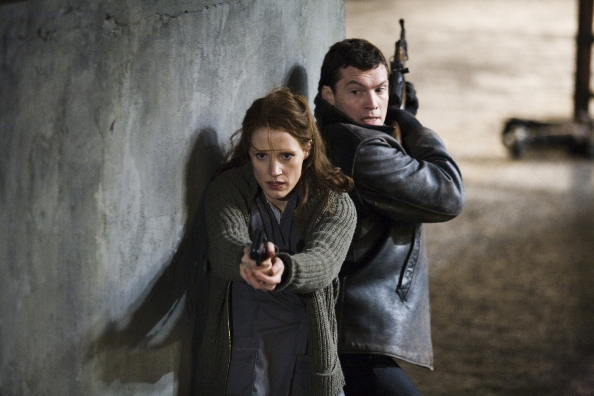
Complex, suspenseful, and surprisingly sensitive, The Debt (2011), a remake of the Israeli film Ha-Hov (2007), made its Israeli premiere at the 2011 Haifa International Film Festival in the presence of the film’s director John Madden and two of the film’s producers, Eitan Evan and Kris Thykier. Midnight East had the opportunity to hear the film’s director, John Madden discuss the film at a press conference on Sunday, October 16, 2011, and continue the conversation later the same day.
The Debt focuses on three Mossad agents, Rachel Singer (Jessica Chastain), David Peretz (Sam Worthington) and Stefan Gold (Marton Csokas) sent on a secret mission to capture a Nazi war criminal. The film moves between past and present, telling the story of that mission and its impact on the lives of the three agents thirty years later. Helen Mirren, Ciarán Hinds and Tom Wilkinson portray the agents as they are in the present timeline of the film – the 1990s.
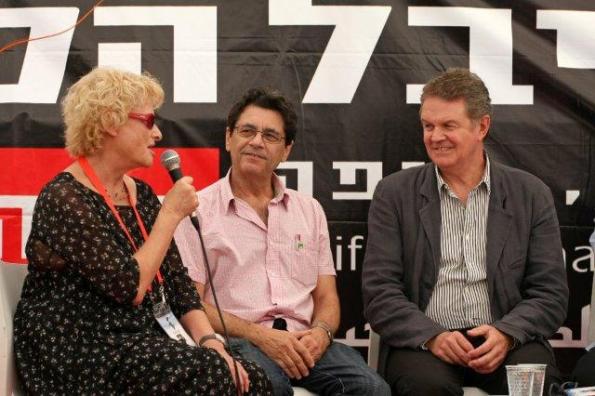
Asked to comment on his vision of the film, Madden replied, “It’s a daunting subject matter and I say that obviously with this particular audience here in mind. It’s extremely challenging from a director’s standpoint because I felt that the narrative of the film wanted to be told as a thriller which is a tricky form if you intend to honor the subject matter with a proper complexity and proper consideration, because it is a form that is associated with manipulation and visceral effects. I felt very strongly that the film needed to get under an audiences’ defenses, but it had a built-in moral complexity. The fact that it deals with moral accountability from multiple perspectives was what was attractive to me about the film. It’s unapologetically a throwback to a different era of cinema, the ‘70s I suppose, the one’s I grew up on, where emotional, moral and psychological complexity were part of the story that you are telling. Given the long shadow of the Holocaust, which is the environment that the film takes place in, that’s a special responsibility.” Madden mentioned The Conversation, Parallax View, Three Days of the Condor and Marathon Man as examples of that kind of film, yet added that “The Debt is not littered with references to those films.”
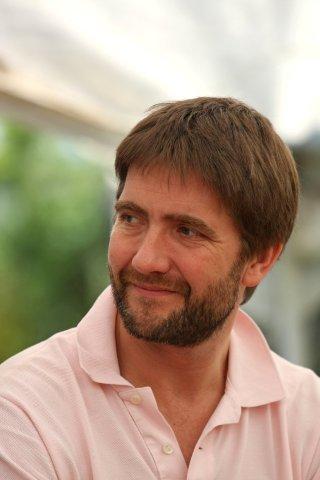
The Israeli scenes in the film were shot on location here in Israel. Madden said, “Kris and I determined to come to see the film launched here because this is where it all began and we were insistent about wanting to shoot here. The film has such a sense of place and the contrast between this kind of world and this light and the kind of dank, oppressive dampness of West Berlin was an important part of the articulation of the film…I find it fascinating getting an Israeli perspective on the film.”
When asked how the cast prepared for their portrayal of Israeli characters, Madden said, “They all burrowed away and did their research. They all did substantial amount of research, particularly Jessica Chastain, that’s just her working method. Some don’t want necessarily to be encumbered with too much information. I’d say there’s a certain kind of age of British actors that doesn’t want to delve too deeply. Antony Hopkins, who I’ve worked with before, says he doesn’t want to know anything about anything just what’s in front of him on the page, I think Tom Wilkinson would be of that school, Helen Mirren somewhere in between.
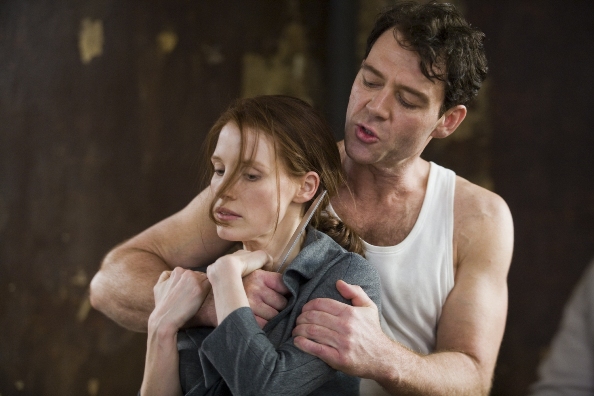
Much has been written about Jessica Chastain, an actress who has generated a great deal of interest in a short time. Madden said, “I was hoping to cast an actress with very little baggage for an audience. I don’t want to say unknown, though relatively speaking Jessica was unknown when we cast her. I didn’t think it useful for an audience to be preoccupied with the notion of how Jessica became Helen Mirren.” Madden found Chastain through the recommendation of someone who had worked with her on Terence Malick’s Tree of Life. “I met her and auditioned her on tape,” Madden recounted, “so that I would have something to persuade the studio of the candidacy, because they studio would have hoped to have a promotable entity. As it turned out they had a promotable entity by the time the film appeared. She’s pretty extraordinary.”
Discussing a thriller can be a daunting task because much of the pleasure in watching the film is the element of surprise. The Debt delivers information to the viewer in a way that generates suspense and involvement with the characters, with unexpected revelations along the way that this writer would prefer to forbear from disclosing. Talking about this aspect of the film with Madden and producer Kris Thykier, they discussed some of their experiences watching the film with an audience, seeing and hearing the reactions. Thykier said, “There’s this lovely sort of “oh!” moment.” Madden reflected, “I find it very strange that the experience of having a rug pulled out beneath you is probably not very pleasurable in life but is extremely pleasurable in film or in any kind of literary form. I suppose the pleasure of suddenly being able to look at something from a completely different perspective is cathartic in some extraordinary kind of way.”

Helen Mirren portrays a former Mossad agent for whom dangerous missions are part of an illustrious past. Talking about her character and the image of Mossad agents in the film, Madden said, “This film tries not to deal in stereotypes…the need for heros is partly what the film is about.” When this writer suggested that perhaps Mirren’s character might be viewed as a human hero, rather than a super hero, Madden replied, “In my book she’s a proper hero.”
Madden is perhaps best known for Shakespeare in Love, yet the prolific director’s career has spanned radio, theatre, television and film. “I was very happy working in television,” he said, “it was a very golden period in British television, always writer led. The writer was a more important figure than the director. That’s absolutely as it should be. Most of that television was multi camera video television… one or two directors got to make full length feature films. Ken Loach was one and Stephen Frears was the other… and I came in round about that time. So I never worked on studio, I always made film. I made a bunch of things for television that were like independent movies essentially because I had freedom. You weren’t given casting imperatives, you had very little editorial interference in the script and you could tell pretty interesting stories in a protected environment, so I was perfectly happy…Mrs. Brown was really my first film that got any kind of attention. I made it for television…but it was picked for theatrical release. That was a kind of creatively good period of my life and a lot of my generation of directors in the UK came up though that system.”
Madden said that the success of Shakespeare in Love, “changed opportunities for me in a big way. Mainly because if you’re lucky enough to make one film that really connects with people, the after effect of that is quite long. People forgive you for stumbling and falling and doing all the things you inevitably do when you’re a film director, because you have to go on stumbling and falling to find the really strong one. If you don’t risk that you’re not doing your job.”
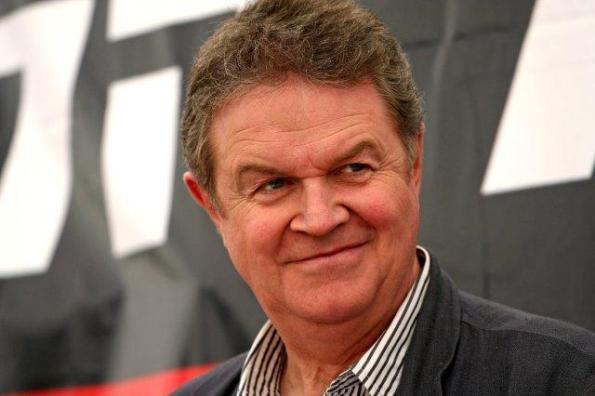
“I really like that bouncing myself off of different disciplines,” said Madden, “underneath it all there’s the same approach, the same concerns and preoccupations…mise en scene is about how you articulate story through movement, through rhythm, through picture and through structure. How you choreograph things, actually. In the case of film you’re choreographing a camera as well. What I learned doing that onstage I never lost for film. Really expressing something dynamically onscreen is about where you put people and where you put the camera in relation to them and how much movement and whether it stops or starts or whether you just hold the shot – those are things I learned from radio. It’s not a visual medium, seriously – listen to The Debt, that’s a part of the way the story communicates, part of the way the story is told.”
Madden has already completed his next project – The Best Exotic Marigold Hotel will be out in March 2012. “It’s about a group of people at a point in life where the world stops paying attention to them – old people, or older people lets say, and I include myself in that constituency. I call it a ‘melancholy comedy’ about a disconnected group of Brits, people who find themselves sort of stuck in their lives for one reason or another – financial difficulty, or bereavement, or physical infirmity or loneliness or whatever it may be. The premise of the film is that they all become aware of a website advertising what is in fact a sort of crumbling Indian palace as a possible place to outsource their retirement. This person has guessed that, not uniquely, the British don’t like their old people very much. This place is run by a very optimistic and slightly hapless young guy who has inherited this property from his father. None of them knows one another except one couple. They go to India and collide with one another and India, and it’s kind of unexpected. It does have a definite affinity with Shakespeare in Love in the sense that it’s about a sort suspended circumstance such as the theatre where normal rules don’t apply.”
The Debt will be released in Israeli theatres on Thursday, October 20, 2011.
The Debt (USA 2011, 114 min, English, German and Ukranian)
Producers: Matthew Vaughn, Kris Thykier, Eduardo Rossoff, Eitan Evan; Screenplay: Matthew Vaughn, Jane Goldman, Peter Straughn, based on the film Ha-Hov written by Assaf Bernstein and Ido Rosenblum; Cinematography: Ben David; Editing: Alexander Berner; Music: Thomas Newman; Cast: Helen Mirren, Sam Worthington, Jessica Chastain, Marton Csokas, Ciarán Hinds, Tom Wilkinson.





